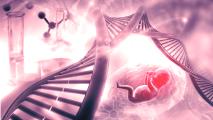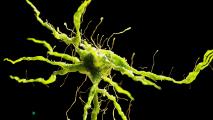An international medical team was able to treat a rare, lethal genetic disorder in a baby before she was born — a first-of-its-kind in utero therapy.
In early 2021, Ayla Bashir was diagnosed in the womb with the deadly disease known as infantile-onset Pompe disease, which had already claimed the lives of two older siblings.
To try to prevent Pompe’s complications, like heart damage and weakened muscles, which begin in the womb, doctors used an experimental enzyme replacement therapy, delivering a crucial enzyme to Ayla directly via the umbilical vein.
She is now over a year old — and healthy.
An international medical team was able to treat a rare, lethal genetic disorder in a baby before she was born — a first-of-its-kind in utero therapy.
The team, spread across UC-San Francisco, Duke University, and Ottawa’s Children’s Hospital of Eastern Ontario (CHEO), needed to overcome both the clock and COVID to deliver the enzyme replacement therapy in time for Ayla to be born healthy.
In addition to being the first successful example of the therapy, the work, written up in the New England Journal of Medicine, can be seen as a proof-of-concept, “expanding the repertoire of fetal therapy,” UCSF pediatric and fetal surgeon Tippi MacKenzie, who was involved in Ayla’s care, told STAT.
What is Pompe disease? Pompe disease is a rare, inheritable, and often lethal condition, belonging to a suite of conditions known as lysosomal storage diseases, where particular enzymes important for breaking down complex molecules are missing.
In people with Pompe, genetic mutations prevent the body from making an important enzyme called GAA. Without GAA, the body cannot break down a form of sugar it stores as energy. When the sugar builds up, the cells of the heart and skeletal muscle take the brunt of the damage, leading to heart and muscle failure.
Enzyme replacement therapy is used to reduce that build up, maintain heart muscle, and improve skeletal muscle.
Administering enzyme replacement therapy in the womb allowed the patient to be born without the potentially lethal complications of Pompe disease.
The prognosis for patients with infantile-onset Pompe disease — those for whom it begins in the womb — is bleak. Without enzyme replacement therapy, their hearts thicken and enlarge until they die of cardiorespiratory failure or respiratory infection — most within a year.
The Bashirs know this all too well — the family had already lost two children to the disease.
“She’s a miracle,” Ayla’s father, Zahid Bashir, said.
Fetal enzyme replacement therapy: CHEO physician Pranesh Chakraborty has been seeing the Bashir family since their first Pompe diagnosis. When the genetic screening results revealed Ayla also had Pompe, Chakraborty had to design an enzyme replacement therapy.
He contacted Priya Kishnani, the chief of medical genetics at Duke, for help, STAT reported. Kishnani’s colleague Jennifer Cohen had been working with UCSF’s MacKenzie, putting together a clinical trial for in utero enzyme replacement therapy.
The teams realized Ayla could be a candidate for the trial.
In early 2021, COVID-19 restrictions blocked travel from San Francisco to Ottawa, where Ayla’s family lives, so the teams shared all the information necessary digitally and began the treatment.
CHEO doctors administered the enzyme six times, beginning at 24 weeks into the pregnancy, Science reported. When Ayla was born, she showed no signs of heart conditions associated with infantile-onset Pompe, and has developed normally.
The work can be seen as a proof-of-concept for other in utero therapies.
Ayla still receives enzyme replacement therapy and will need to continue it indefinitely, unless potential permanent therapies like stem cell transplants and gene therapies currently in clinical trials become available, Kishnani and Cohen told Science.
“The hope is that if we can prevent neurologic damage starting in utero, we can halt progression and hopefully serve as a bridge.”
We’d love to hear from you! If you have a comment about this article or if you have a tip for a future Freethink story, please email us at tips@freethink.com.






